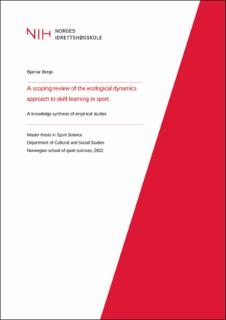| dc.description.abstract | Skill learning in sport is a relevant topic for researchers and sports practitioners and -pedagogues. Its been proposed that a sound theoretical model of the learner and the learning process could result in scientific and practical progress (Renshaw et al., 2009, p. 3). The theoretical perspective of ecological dynamics has been identified as a viable candidate for such modeling (Seifert et al., 2017). However, no comprehensive overview or knowledge synthesis of empirical research is available. The aim of this scoping review is to identify, summarize, and present all empirical research on skill learning in sports underpinned by an ecological dynamics rationale. For this purpose, a systematic literature search was conducted in four databases and looked at articles published from year 2000 to the date of the literature search (19.10.2021). The reviewing process followed PRISMA-ScR (Preferred Reporting Items for Systematic reviews and Meta-Analyses extension for Scoping Reviews) (Tricco et al., 2018). 30 studies were included based on theoretical (i.e., ecological dynamics), contextual (sports context), and methodological (i.e., empirical, and investigation learning effects over time) inclusion criteria. Subsequent methodological assessment was done using MMAT (Mixed methods appraisal tool) (Hong et al., 2018). It was identified a highly heterogeneous collection of articles that differed in terms of basic line of inquiry and based on descriptive- and methodological variables. Furthermore, two pedagogical and practice design approaches, Constraints-led approach (CLA) (Button et al., 2020; Davids et al., 2008), and Differential learning (DL) (Schollhorn et al., 2012) were identified. Findings from the interventions indicate that self-organized forms of learning are at least a viable alternative to traditional approaches (i.e., prescriptive instruction, skill decomposition and corrective feedback) for skill learning in sport. Future research should continue the work of empirically investigating skill learning based on studies that are of high quality and commensurate with the theoretical perspective of ecological dynamics. | en_US |
